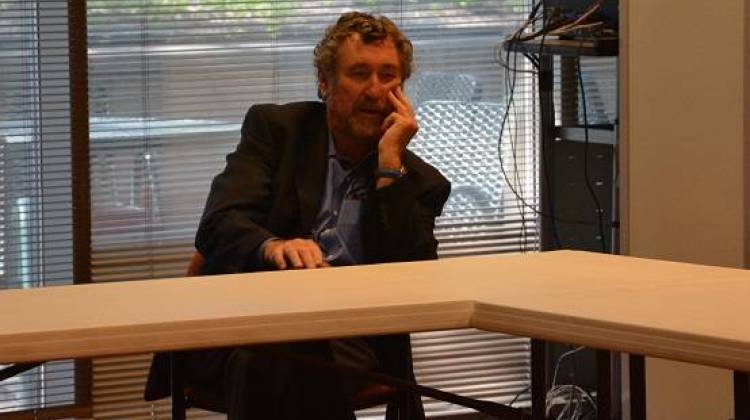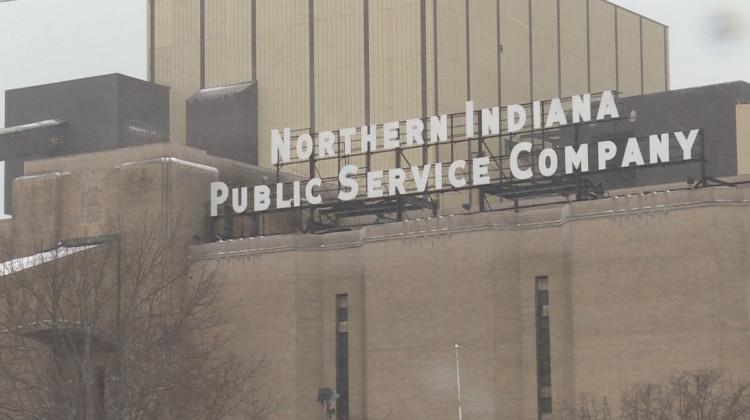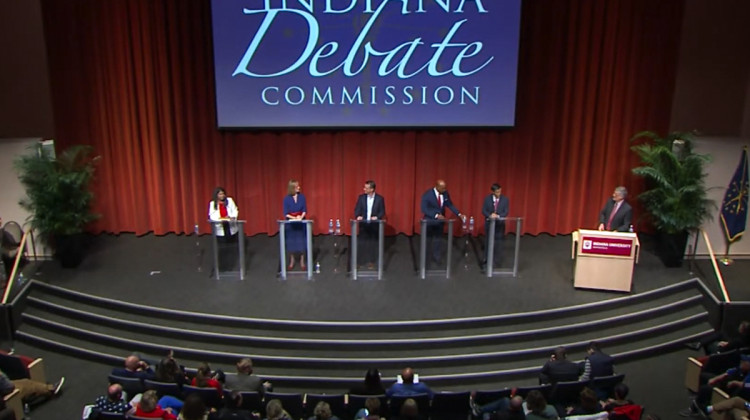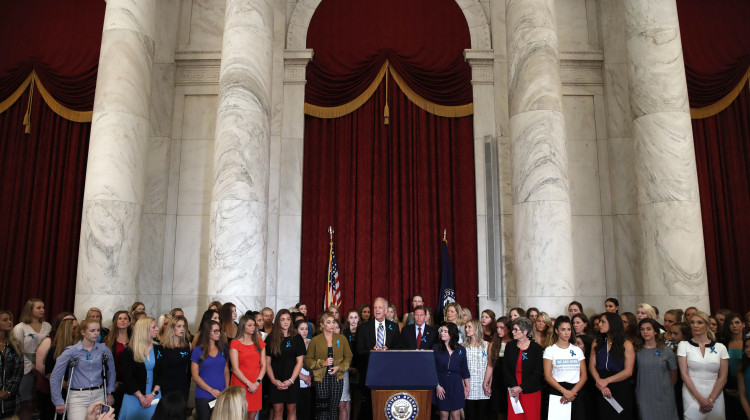For more than 30 years, PBS’ signature investigative series, Frontline, has made people look – and listen. These documentary stories have changed law and policy, helped free wrongfully convicted inmates, and shed light on everything from the sexual abuse of female farmworkers in California to the international export of hazardous waste.
David Fanning has been the executive producer of Frontline since its beginning in 1983. During a recent visit to Indianapolis to speak at the Economic Club of Indiana, Fanning sat down with WFYI’s Michelle Johnson to talk about the program’s impact and its future. (This is an edited transcript of the conversation.)
WFYI: When you’re aiming for impact, who are you aiming for — the public, or policymakers, or all of the above?
DF: We don’t aim for impact. Our primary mission is to try to unwrap or unravel or tell or drive a line through a complicated set of circumstances and try to make sense of them in some way. You don’t try to do it to change policy. That’s a different kind of journalism, a kind of advocacy journalism that moves toward certain results. Frontline’s always prided itself on its independence.
WFYI: In an interview a couple of years ago in Current, the newspaper covering public media, you said, “If you can’t make it important, it’s probably not worth doing.”
DF: (laughs) Well, I think that’s right. I think this is a precious privilege that we have to do this work. The networks have long since abandoned this kind of investigative journalism. The stations like here in Indiana, who buy into the national program service of PBS, which gives us the budget every year to go make these programs. We sit around in the office and we think very hard about (projects) before we say ‘yes, let’s go do that.’ And we better take on the signature stories of our time.
WFYI: How do you go about deciding what stories Frontline will pursue in a given season?
DF: We always have running lists of things that you know are important. (But) you can’t get caught too much by the events of the day. We are fortunate at times that we can have the reflexes that are closer to the drumbeat of news, but more often than not, we try to lean back and say “many of these stories are continuing stories, they’re going to be here next year, so we should just go ahead and do it right.”
WFYI: And it’s also about finding partners who have been following partners, reporting partners, who have been following those issues for a long time.
DF: We worried a lot about the loss of investigative units at both broadcasters and newspapers. Much of television, by the way, 60 Minutes included, depended on local newspapers to generate stories that they would then turn into television. Now we turn to some of the nonprofits, like ProPublica, The Center for Public Integrity, The Center for Investigative Reporting, The Marshall Project as well, and have done collaborations with them. There, a particular journalist has been funded to work for a while in a particular area, and he or she has gathered water behind the dam, knowing that we can go in then and figure out how to make a film together.
WFYI: One of the things that Frontline has done especially successfully, and pretty early, was to extend itself into the digital space, on the web.
DF: You know, the thing about television was that you spent six or nine months making a film, you crafted it within an inch of its life, like a making a fine cabinet, and then one night you threw it in the air, and some of it hit the satellite and came back and the rest went to Mars. It was gone. And only the occasional person who had access to a VHS tape could ever see it again. This (digital media) has changed everything we do, and in a way it has changes the contract you make with the work you do. You say “OK, I’m not making this for one night at 9 o’clock, I’m making it for the long-term. I’m making it for the future.” That matters.
WFYI: The program can – and has – taken some extraordinary risks, not in terms of its journalism, but in terms of the subject matter, sometimes to the chagrin of funders or other interested parties, and there’s been some pressure, let’s be honest.
DF: You just do what you have to do. You set out to do stories that you think are important and you go ahead and do them. We never wanted to be set into some ideological box, we never wanted ever to be pegged with taking sides – unless of course we’ve come to some conclusion about a story that’s so profoundly important to tell, and nobody will talk to us on the other side of that argument, we’re going to say ‘here’s the evidence that this shows, and we’re going to defend it and we’re going to make sure that we’re completely tight about the journalism. I think that just goes with the territory.
WFYI: What issues are you committed to now at Frontline?
DF: We’ll continue to do stories in the Middle East. We’re in the middle of doing a film called “Obama At War,” and we’re also going to continue to look at the limits of American power and our influence in this region. We’ll be looking at Iran. We can't help but look at what happened between Netanyahu and Obama; there’s a thread of a story there that we think is important. We did a four-hour film called “Drug War” in the late ‘90s and we’re coming back to that, and it’s about what’s happened to the drug war. And yet we’ll also do films as surprising as “Growing Up Trans,” about transgender, which is a moving, powerful, extraordinarily delicate film that will go out at the end of June. The series will always keep ranging across all kinds of subjects.
WFYI: What concerns you, if anything, about the future of public broadcasting, particularly as it concerns the kind of work you’ve been doing at Frontline?
DF: We’ve had extraordinary support from public broadcasting to do this work, and that’s in its own way a great tribute to public broadcasting. I think the great challenge of public broadcasting is the digital age. And how we manage to make that transition is really important. We have a close relationship to our membership; we need to bring our members with us into that space. We have a very direct relationship to our very loyal viewers, so let’s take them with us into this new age and figure out a new model of membership and partnership. That’s the way in which we can build public broadcasting.
 DONATE
DONATE







 View More Programs
View More Programs


 Support WFYI. We can't do it without you.
Support WFYI. We can't do it without you.